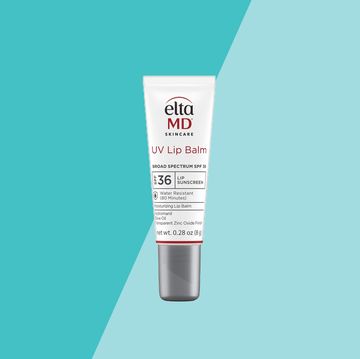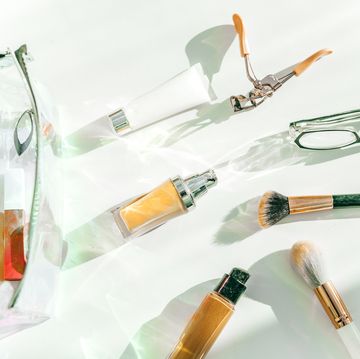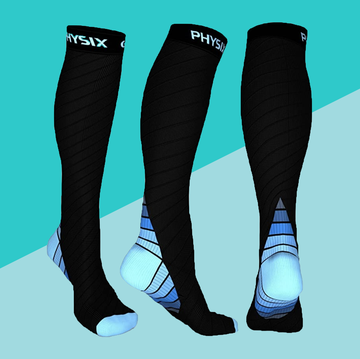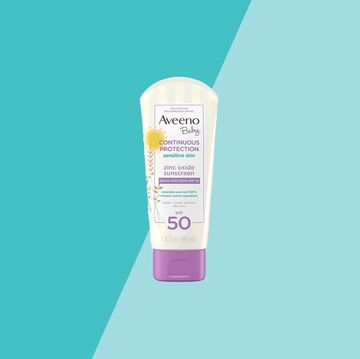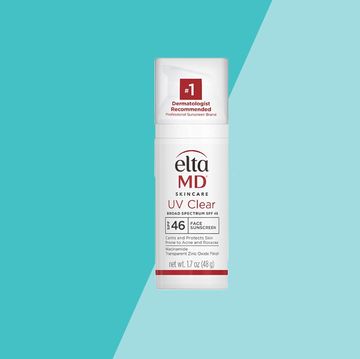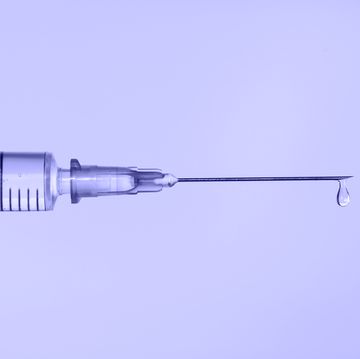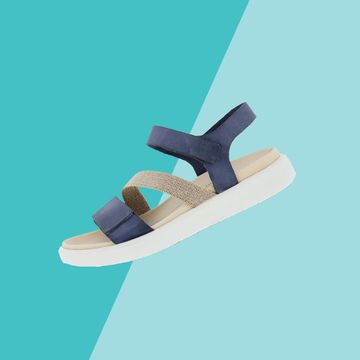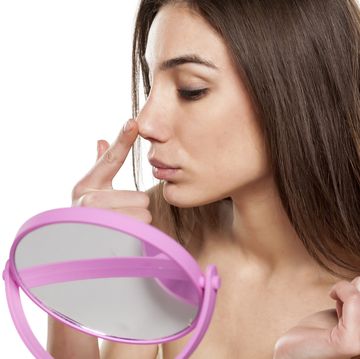Sunscreen. Moisturizers. Retinol. By now, we know these are the keepers, the key to healthy skin. But which ones are the baddies, the products we should be purging from our routine? To find out, we asked dermatologists what they'd never put on their face. Their answers might surprise you—and will definitely motivate you to clean out your bathroom, stat.
1. Physical Exfoliation
You'll never catch Meghan O'Brien, MD, a dermatologist at Tribeca Park Dermatology in New York City, using abrasive pads or wipes. "I find that both for myself and for my patients, physical exfoliation can lead to irritation and dryness, especially in colder months," she explains. "It can also irritate skin conditions such as acne and eczema."
Elizabeth Tanzi, MD, codirector of the Washington Institute of Dermatologic Laser Surgery in Washington, DC, concurs: "I avoid any harsh facial scrubs that have ground 'pits' in them because these pits can be very sharp and way too irritating and abrasive to the skin." Generally, it's best to steer clear of microbeads, ground nut shells, and stone fruit pits.
A smarter move: "I like gentle scrubs with smooth beads to carefully exfoliate without overly irritating the skin," says Tanzi. The smoothest beads are jojoba, since they melt past a certain point and have hydrating qualities. Find them in Neutrogena Naturals Purifying Pores Scrub ($7, drugstore.com). O'Brien prefers chemical exfoliants to turn over skin cells, such as glycolic acid, retinol, and retinoids; she recommends the RoC Retinol line. They have the added benefit of anti-aging properties. Follow up with a moisturizer containing ceramides to get the skin-smoothing benefits without the irritation.
(Does menopause have your hair and skin out of whack? Then try The Natural Menopause Solution for ideas on how to ease your menopause symptoms.)
2. Shampoo
It might seem OK to use shampoo to wash your face or body when you've run out of cleanser—but that's a really bad idea. "I find that women are using shampoo in emergencies when they don't have their regular cleansers, but shampoo is designed to clean your hair, not your skin," says Joshua Zeichner, MD, director of cosmetic and clinical research in dermatology at Mount Sinai Hospital in New York City. Shampoo contains surfactants that remove the dirt and oil that coat the surface of your hair, but these are too harsh for the skin, so they can cause irritation and inflammation, and disrupt the skin's ability to maintain hydration and protect itself from the environment.
A smarter move: If you have sensitive skin, you need to be extra careful. Opt for cleansers that are specifically for the face and body. "Skin cleansers contain gentle surfactants that are designed to remove excess dirt, oil, and sweat without disrupting skin function," says Zeichner. "When you're in a pinch, rinse cool water on the face without any cleanser at all."
MORE: 9 Haircuts That Take Off Years
3. Mineral Oil
"Mineral oil can clog pores," says Dendy Engelman, MD, of Manhattan Dermatology and Cosmetic Surgery. "This can lead to acneiform eruptions, blackheads, milia—very undesirable results." Mineral oil is used in many products, from lotions and creams to cleansers, makeup remover, perfumes, shampoos, and cosmetics including mascara, lipsticks, and foundations. Many people who use products containing mineral oil have no idea this ingredient is causing their blemishes. Check the ingredient label to tell if the product is free of mineral oil—liquid paraffin, liquid petroleum, paraffin oil, paraffinum liquidum, petrolatum liquid, petroleum oil, white mineral oil, and white oil are all mineral oils.
A smarter move: Engelman recommends swapping mineral oil products for SkinCeuticals Metacell Reneral ($110, skinceuticals.com). "It is a beautiful emulsion that contains the powerful and protective vitamin B3—niacinamide—as well as glycerin and tripeptide concentrate. This is not only protective against photo damage, but is also corrective against the signs of photo aging. Plus, the glycerin in this emulsion provides a lovely glow to the skin without being comedogenic." Her pick is Cetaphil for mineral oil–free options for facial and body cleansers as well as creams and lotions, and BareMinerals and CoverFX for makeup lines.
4. Regular Soap
"I never, ever use a harsh, regular soap as a face or body cleanser because it stresses my skin for several reasons," says Ellen Marmur, MD, associate clinical professor in the department of dermatology at Mount Sinai Medical Center. "Regular soap strips skin of essential nutrients, which may result in decreased skin elasticity. Additionally, it uses harsh cleansers created via a chemical process to clean skin, resulting in a loss of critical moisture and leaving it rough, dry, and itchy." Marmur explains that regular soap is formed primarily from tallow and coconut and palm oils via a chemical process called saponification, which converts the oils to soap. Soap can extract lipids from the outermost layer of skin, withdrawing its natural moisturizing factors. Traditional soaps were used for everything from cleaning the house to to washing the skin.
A smarter move: As an alternative, Marmur recommends using a gentle cleanser that's fragrance-free, hypoallergenic, and replenishes nutrients in the skin. Sticking to a cleanser that's designed for your face is generally a safe bet; we like Bosica Detoxifying Black Cleanser ($28, sephora.com).
MORE: Why The Heck Is My Hair Fallng Out?
5. Skin Products With Alcohol
There's a reason it's good to read the ingredient label: If Gervaise Gerstner, MD, a dermatologist in New York City, sees alcohol listed in the first few ingredients, she avoids those products as they can be drying and irritating and can exacerbate rosacea, acne, and eczema.
A smarter move: "Instead of alcohol, look for an essence or toner that is water based, so you're not drying your skin out," says Gerstner. Try Yours Truly Organics Balancing Toner ($42, rodales.com).
6. Hair Depilatories & Hair Removal Creams
Unless you're a pro, it's best to always steer clear of these formulas. "Contact dermatitis from hair removal creams can be like a second-degree burn," cautions Gerstner.
A smarter move: "I would recommend either laser hair removal or simply shaving in place of using hair depilatories," says Gerstner.
7. Permanent Fillers
"I would never have a permanent filler injected into my skin," says New York City dermatologist Debra Jaliman, MD. Permanent fillers are made of polymethylmethacrylate beads, a nonbiodegradable, biocompatible, man-made material. "If you get a complication, it's permanent. So for example, if you get a lump or a bump or redness or firmness, you cannot dissolve it and you are unfortunately stuck with it, unless you cut it out, which would leave a scar."
A smarter move: Jaliman prefers to use hyaluronic acid filler that can be dissolved if complications arise. She recommends Restylane Silk for fine lines and acne scars and for the borders of the lip, Beletero for fine lines, Juvederm ultra for filling lips and smile lines, Perlane for deep depressions by the sides of the mouth, and Radiesse for marionette lines.
MORE: 10 Amazing Beauty Tricks With Coconut Oil
8. Products With Added Fragrances
Many skin-care items contain fragrances that cause breakouts and irritation, cautions Helen M. Torok, who practices dermatology in Trillium Creek in Wooster, OH. "I personally use fragrance-free products since fragrance is one of the top sensitizers in our skin care products," she says. "Try to avoid ingredients like lanolin, wool wax alcohol, cinnamic aldehyde, alcohol, fragrance, and formaldehyde."
A smarter move: "I recommend a moisturizer that repairs and enhances your skin's natural barrier, like Neova DNA Barrier Accelerator [$105, neova.com]. It's a great solution for those looking to lock in moisture and boost water retention while keeping environmental detractors out."
Celia Shatzman (she/her) is a Brooklyn-based writer and editor who has penned stories on topics ranging from beauty to fashion, travel, celebrities, health, entertainment, finance and more. A graduate of the Medill School of Journalism at Northwestern University, she is a beauty and style contributor at Forbes and her work has appeared in New York, Cosmopolitan, WWD, ELLE, Conde Nast Traveler, Afar, Travel + Leisure, Women’s Health, Marie Claire, Byrdie, Refinery29 and NYLON, among others.



